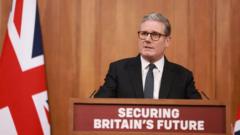Why Did Starmer Regret Calling Britain an Island of Strangers?

Understanding the Controversy Surrounding Sir Keir Starmer's Immigration Speech
In a recent turn of events, Prime Minister Sir Keir Starmer has publicly expressed regret over his choice of words in a speech addressing immigration, particularly a phrase that drew comparisons to the controversial rhetoric of former MP Enoch Powell. This situation has sparked significant debate within the political arena, unveiling deeper issues regarding immigration discourse in the UK. Understanding the implications of Sir Keir's remarks, the historical context of immigration in Britain, and the subsequent reactions can provide valuable insight into the current political climate.
The Context of Sir Keir Starmer's Speech
In May, during a speech aimed at announcing new plans to control immigration, Sir Keir Starmer made the remark that the UK risked becoming "an island of strangers." This statement was met with immediate backlash, with critics accusing him of employing divisive language reminiscent of Enoch Powell's infamous "Rivers of Blood" speech from 1968. Powell's speech warned of the dangers of immigration and painted a picture of a future where Britons would feel alienated in their own country, a sentiment that has since become associated with xenophobia and racial tension.
Immediate Reactions to the Speech
The political environment surrounding Sir Keir's speech was charged, particularly after Labour's losses in the local elections. Critics, including former Labour MP John McDonnell and current MP Nadia Whittome, highlighted the dangers of using such language, arguing that it could incite racial abuse and further alienate immigrant communities. McDonnell emphasized the importance of careful language in political discourse, particularly when discussing sensitive topics like immigration.
In the aftermath, Sir Keir faced pressure from both within his party and the opposition. Notably, Nigel Farage, leader of Reform UK, seized the opportunity to criticize Sir Keir's leadership, suggesting that his regret indicated a lack of genuine beliefs or convictions. Farage's remarks underscore a broader narrative that challenges the integrity and authenticity of political leaders in the face of public scrutiny.
Sir Keir Starmer's Regret and Reflection
In an interview with biographer Tom Baldwin, Sir Keir reflected on his speech, stating, "I wouldn't have used those words if I had known they were, or even would be interpreted as an echo of Powell." This admission signifies a moment of introspection, revealing that neither he nor his speechwriters were aware of the potential implications of the phrase. He went on to express regret, stating, "I deeply regret using it," which illustrates a willingness to acknowledge mistakes.
Sir Keir also shared the personal context that may have influenced his state during the speech. He mentioned that he had recently experienced an alleged arson attack on his family home, which understandably affected his emotional state. This insight adds a layer of complexity to the situation, as it reflects the pressures and challenges leaders face while navigating public discourse amidst personal turmoil.
The Historical Echo: Enoch Powell's Legacy
The connection drawn between Sir Keir’s remarks and Powell’s infamous speech is deeply rooted in the UK's historical struggles with immigration. Powell's "Rivers of Blood" speech is often cited as a turning point in British political rhetoric, as it openly expressed fears about immigration and its impact on British society. Despite the decades that have passed since Powell's address, echoes of his sentiments can still be felt in contemporary discussions about immigration policy.
In his speech, Powell warned of a future where immigrants would outnumber native Britons, leading to cultural displacement and societal unrest. While many viewed his speech as a call for caution regarding immigration, others condemned it for fostering xenophobia and racial division. The ongoing relevance of Powell's speech in modern political discourse illustrates the challenge faced by leaders who navigate the complexities of immigration and national identity.
The Broader Implications of Immigration Discourse
Sir Keir's speech and the subsequent controversy highlight the broader implications of immigration discourse in the UK. As immigration remains a contentious issue, the language used by political leaders carries significant weight, influencing public perception and shaping policies. The rhetoric surrounding immigration can either foster inclusivity or perpetuate division, making it imperative for leaders to choose their words carefully.
The Role of Political Leadership
In the realm of political leadership, the ability to communicate effectively is crucial. Leaders must demonstrate empathy and understanding, particularly when addressing sensitive topics like immigration. The backlash against Sir Keir's speech serves as a reminder that words have power, and careless language can lead to unintended consequences.
Moreover, the political landscape in the UK is characterized by a growing demand for leaders who can articulate a clear vision for the future. As public sentiment shifts, there is an increasing expectation for leaders to engage in thoughtful dialogue about immigration, balancing the need for control with a recognition of the contributions of immigrants to society.
Immigration Policy in the UK: Current Challenges
The UK’s immigration policy has faced significant scrutiny in recent years, particularly in light of Brexit and the changing political landscape. As the nation grapples with the implications of its departure from the European Union, questions surrounding immigration remain at the forefront of political discourse.
Key challenges include:
- Public Sentiment: The polarized views on immigration create a complex environment for policymakers. Balancing the need for security with the recognition of immigrants' contributions is essential.
- Economic Factors: Immigration is often linked to economic growth. Leaders must navigate the benefits of skilled labor while addressing public concerns about job competition.
- Social Cohesion: Ensuring that immigrants are integrated into society and that communities remain cohesive is vital for national unity.
Conclusion: The Path Forward
As the UK continues to navigate the complexities of immigration, the words of its leaders will play a pivotal role in shaping public discourse. Sir Keir Starmer's recent admission of regret serves as a reminder that political communication requires sensitivity and awareness of historical context. Moving forward, it is essential for leaders to foster an environment of inclusivity and understanding, recognizing the diverse contributions of immigrants to British society.
In a world where immigration remains a hot-button issue, how can political leaders ensure their language promotes unity rather than division? The challenge lies in balancing the need for immigration control with the recognition of the humanity and contributions of those who seek a better life in the UK.
FAQs
What did Sir Keir Starmer say that caused controversy?
Sir Keir Starmer stated that the UK risked becoming "an island of strangers" during a speech about immigration, which drew comparisons to Enoch Powell's divisive rhetoric.
Why did Sir Keir Starmer express regret?
He expressed regret after realizing the potential implications of his words, which were interpreted as reminiscent of Powell's infamous speech on immigration.
What historical context is associated with Enoch Powell's speech?
Enoch Powell's "Rivers of Blood" speech in 1968 warned of the dangers of immigration and its impact on British society, becoming a controversial touchstone in discussions about race and immigration.
As the discourse surrounding immigration continues to evolve, how can leaders strike a balance between the need for control and the commitment to inclusivity? #ImmigrationDebate #PoliticalLeadership #UKPolitics
Published: 2025-06-27 13:01:08 | Category: sport



